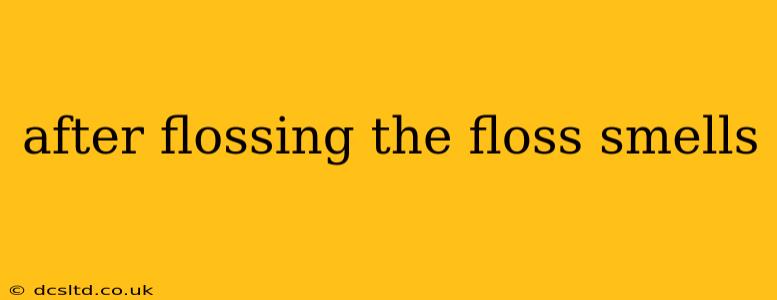Flossing is a crucial part of maintaining good oral hygiene, but sometimes you might notice an unpleasant odor on your floss after use. This isn't necessarily a sign of poor hygiene, but it does indicate something is happening in your mouth. Understanding the causes can help you address the issue and improve your overall oral health.
What Causes My Floss to Smell Bad After Flossing?
The smell on your floss after flossing often comes from bacteria and food particles trapped between your teeth. These particles, combined with saliva, create a breeding ground for bacteria that produce volatile sulfur compounds (VSCs). These VSCs are the primary culprits behind bad breath (halitosis) and the unpleasant odor on your floss.
Why does my floss smell like sulfur?
That sulfurous smell is a direct result of the volatile sulfur compounds produced by bacteria breaking down proteins in food debris trapped between your teeth. The tighter the spaces between your teeth, the more likely you are to encounter this odor, as bacteria thrive in these hard-to-reach areas.
Does it mean I have gum disease?
While a smelly floss doesn't automatically diagnose gum disease (gingivitis or periodontitis), it can be a warning sign. Persistent bad breath and a consistently foul-smelling floss can indicate the presence of gum disease. Bacteria associated with gum disease produce significant quantities of VSCs, resulting in a more pronounced odor.
How can I tell if it's just food or something more serious?
A mild, occasional odor on your floss after flossing, especially after consuming strong-smelling foods like garlic or onions, is usually nothing to worry about. However, if the odor is persistent, strong, and accompanied by other symptoms such as bleeding gums, red or swollen gums, receding gums, or persistent bad breath, it's crucial to consult a dentist. These symptoms may point towards gum disease or other oral health issues.
Can the type of floss I use affect the smell?
The type of floss you use might influence the odor, although it's not the primary cause. Some people find that waxed floss is easier to use and removes debris more effectively, potentially reducing the odor. However, the most significant factor remains the thoroughness of your flossing technique and the overall cleanliness of your mouth.
What should I do if my floss smells consistently bad?
If your floss consistently smells bad, you should prioritize improving your oral hygiene routine. This involves:
- Flossing more effectively: Ensure you're using the correct technique to reach all the spaces between your teeth.
- Brushing thoroughly: Brush your teeth twice a day with fluoride toothpaste for at least two minutes each time.
- Using an antimicrobial mouthwash: An antimicrobial mouthwash can help reduce bacteria in your mouth.
- Regular dental checkups: Schedule regular visits to your dentist for professional cleanings and checkups.
Conclusion: Smelly Floss - A Sign to Take Notice
While an occasional unpleasant odor on your floss is relatively common, persistent bad breath and a consistently foul-smelling floss should not be ignored. Pay close attention to your oral health routine and consult your dentist if you have concerns. Maintaining good oral hygiene is vital for overall health and well-being. Don't hesitate to address any issues promptly.
